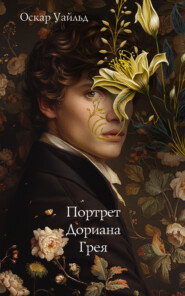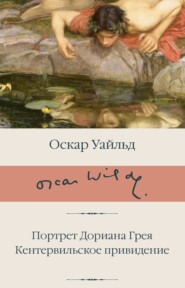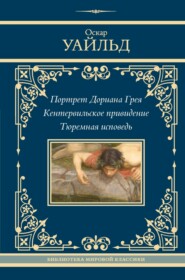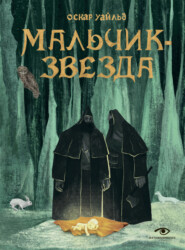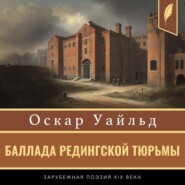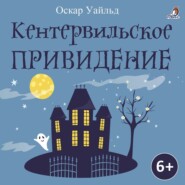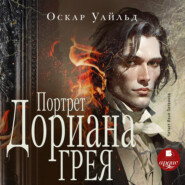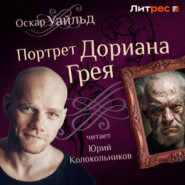По всем вопросам обращайтесь на: info@litportal.ru
(©) 2003-2025.
✖
Lord Arthur Savile's Crime; The Portrait of Mr. W.H., and Other Stories
Настройки чтения
Размер шрифта
Высота строк
Поля
Ten minutes later, with face blanched by terror, and eyes wild with grief, Lord Arthur Savile rushed from Bentinck House, crushing his way through the crowd of fur-coated footmen that stood round the large striped awning, and seeming not to see or hear anything. The night was bitter cold, and the gas-lamps round the square flared and flickered in the keen wind; but his hands were hot with fever, and his forehead burned like fire. On and on he went, almost with the gait of a drunken man. A policeman looked curiously at him as he passed, and a beggar, who slouched from an archway to ask for alms, grew frightened, seeing misery greater than his own. Once he stopped under a lamp, and looked at his hands. He thought he could detect the stain of blood already upon them, and a faint cry broke from his trembling lips.
Murder! that is what the cheiromantist had seen there. Murder! The very night seemed to know it, and the desolate wind to howl it in his ear. The dark corners of the streets were full of it. It grinned at him from the roofs of the houses.
First he came to the Park, whose sombre woodland seemed to fascinate him. He leaned wearily up against the railings, cooling his brow against the wet metal, and listening to the tremulous silence of the trees. ‘Murder! murder!’ he kept repeating, as though iteration could dim the horror of the word. The sound of his own voice made him shudder, yet he almost hoped that Echo might hear him, and wake the slumbering city from its dreams. He felt a mad desire to stop the casual passer-by, and tell him everything.
Then he wandered across Oxford Street into narrow, shameful alleys. Two women with painted faces mocked at him as he went by. From a dark courtyard came a sound of oaths and blows, followed by shrill screams, and, huddled upon a damp door-step, he saw the crook-backed forms of poverty and eld. A strange pity came over him. Were these children of sin and misery predestined to their end, as he to his? Were they, like him, merely the puppets of a monstrous show?
And yet it was not the mystery, but the comedy of suffering that struck him; its absolute uselessness, its grotesque want of meaning. How incoherent everything seemed! How lacking in all harmony! He was amazed at the discord between the shallow optimism of the day, and the real facts of existence. He was still very young.
After a time he found himself in front of Marylebone Church. The silent roadway looked like a long riband of polished silver, flecked here and there by the dark arabesques of waving shadows. Far into the distance curved the line of flickering gas-lamps, and outside a little walled-in house stood a solitary hansom, the driver asleep inside. He walked hastily in the direction of Portland Place, now and then looking round, as though he feared that he was being followed. At the corner of Rich Street stood two men, reading a small bill upon a hoarding. An odd feeling of curiosity stirred him, and he crossed over. As he came near, the word ‘Murder,’ printed in black letters, met his eye. He started, and a deep flush came into his cheek. It was an advertisement offering a reward for any information leading to the arrest of a man of medium height, between thirty and forty years of age, wearing a billy-cock hat, a black coat, and check trousers, and with a scar upon his right cheek. He read it over and over again, and wondered if the wretched man would be caught, and how he had been scarred. Perhaps, some day, his own name might be placarded on the walls of London. Some day, perhaps, a price would be set on his head also.
The thought made him sick with horror. He turned on his heel, and hurried on into the night.
Where he went he hardly knew. He had a dim memory of wandering through a labyrinth of sordid houses, of being lost in a giant web of sombre streets, and it was bright dawn when he found himself at last in Piccadilly Circus. As he strolled home towards Belgrave Square, he met the great waggons on their way to Covent Garden. The white-smocked carters, with their pleasant sunburnt faces and coarse curly hair, strode sturdily on, cracking their whips, and calling out now and then to each other; on the back of a huge grey horse, the leader of a jangling team, sat a chubby boy, with a bunch of primroses in his battered hat, keeping tight hold of the mane with his little hands, and laughing; and the great piles of vegetables looked like masses of jade against the morning sky, like masses of green jade against the pink petals of some marvellous rose. Lord Arthur felt curiously affected, he could not tell why. There was something in the dawn’s delicate loveliness that seemed to him inexpressibly pathetic, and he thought of all the days that break in beauty, and that set in storm. These rustics, too, with their rough, good-humoured voices, and their nonchalant ways, what a strange London they saw! A London free from the sin of night and the smoke of day, a pallid, ghost-like city, a desolate town of tombs! He wondered what they thought of it, and whether they knew anything of its splendour and its shame, of its fierce, fiery-coloured joys, and its horrible hunger, of all it makes and mars from morn to eve. Probably it was to them merely a mart where they brought their fruits to sell, and where they tarried for a few hours at most, leaving the streets still silent, the houses still asleep. It gave him pleasure to watch them as they went by. Rude as they were, with their heavy, hob-nailed shoes, and their awkward gait, they brought a little of a ready with them. He felt that they had lived with Nature, and that she had taught them peace. He envied them all that they did not know.
By the time he had reached Belgrave Square the sky was a faint blue, and the birds were beginning to twitter in the gardens.
CHAPTER III
When Lord Arthur woke it was twelve o’clock, and the midday sun was streaming through the ivory-silk curtains of his room. He got up and looked out of the window. A dim haze of heat was hanging over the great city, and the roofs of the houses were like dull silver. In the flickering green of the square below some children were flitting about like white butterflies, and the pavement was crowded with people on their way to the Park. Never had life seemed lovelier to him, never had the things of evil seemed more remote.
Then his valet brought him a cup of chocolate on a tray. After he had drunk it, he drew aside a heavy portière of peach-coloured plush, and passed into the bathroom. The light stole softly from above, through thin slabs of transparent onyx, and the water in the marble tank glimmered like a moonstone. He plunged hastily in, till the cool ripples touched throat and hair, and then dipped his head right under, as though he would have wiped away the stain of some shameful memory. When he stepped out he felt almost at peace. The exquisite physical conditions of the moment had dominated him, as indeed often happens in the case of very finely-wrought natures, for the senses, like fire, can purify as well as destroy.
After breakfast, he flung himself down on a divan, and lit a cigarette. On the mantel-shelf, framed in dainty old brocade, stood a large photograph of Sybil Merton, as he had seen her first at Lady Noel’s ball. The small, exquisitely-shaped head drooped slightly to one side, as though the thin, reed-like throat could hardly bear the burden of so much beauty; the lips were slightly parted, and seemed made for sweet music; and all the tender purity of girlhood looked out in wonder from the dreaming eyes. With her soft, clinging dress of crêpe-de-chine, and her large leaf-shaped fan, she looked like one of those delicate little figures men find in the olive-woods near Tanagra; and there was a touch of Greek grace in her pose and attitude. Yet she was not petite. She was simply perfectly proportioned – a rare thing in an age when so many women are either over life-size or insignificant.
Now as Lord Arthur looked at her, he was filled with the terrible pity that is born of love. He felt that to marry her, with the doom of murder hanging over his head, would be a betrayal like that of Judas, a sin worse than any the Borgia had ever dreamed of. What happiness could there be for them, when at any moment he might be called upon to carry out the awful prophecy written in his hand? What manner of life would be theirs while Fate still held this fearful fortune in the scales? The marriage must be postponed, at all costs. Of this he was quite resolved. Ardently though he loved the girl, and the mere touch of her fingers, when they sat together, made each nerve of his body thrill with exquisite joy, he recognised none the less clearly where his duty lay, and was fully conscious of the fact that he had no right to marry until he had committed the murder. This done, he could stand before the altar with Sybil Merton, and give his life into her hands without terror of wrongdoing. This done, he could take her to his arms, knowing that she would never have to blush for him, never have to hang her head in shame. But done it must be first; and the sooner the better for both.
Many men in his position would have preferred the primrose path of dalliance to the steep heights of duty; but Lord Arthur was too conscientious to set pleasure above principle. There was more than mere passion in his love; and Sybil was to him a symbol of all that is good and noble. For a moment he had a natural repugnance against what he was asked to do, but it soon passed away. His heart told him that it was not a sin, but a sacrifice; his reason reminded him that there was no other course open. He had to choose between living for himself and living for others, and terrible though the task laid upon him undoubtedly was, yet he knew that he must not suffer selfishness to triumph over love. Sooner or later we are all called upon to decide on the same issue – of us all, the same question is asked. To Lord Arthur it came early in life – before his nature had been spoiled by the calculating cynicism of middle-age, or his heart corroded by the shallow, fashionable egotism of our day, and he felt no hesitation about doing his duty. Fortunately also, for him, he was no mere dreamer, or idle dilettante. Had he been so, he would have hesitated, like Hamlet, and let irresolution mar his purpose. But he was essentially practical. Life to him meant action, rather than thought. He had that rarest of all things, common sense.
The wild, turbid feelings of the previous night had by this time completely passed away, and it was almost with a sense of shame that he looked back upon his mad wanderings from street to street, his fierce emotional agony. The very sincerity of his sufferings made them seem unreal to him now. He wondered how he could have been so foolish as to rant and rave about the inevitable. The only question that seemed to trouble him was, whom to make away with; for he was not blind to the fact that murder, like the religions of the Pagan world, requires a victim as well as a priest. Not being a genius, he had no enemies, and indeed he felt that this was not the time for the gratification of any personal pique or dislike, the mission in which he was engaged being one of great and grave solemnity. He accordingly made out a list of his friends and relatives on a sheet of notepaper, and after careful consideration, decided in favour of Lady Clementina Beauchamp, a dear old lady who lived in Curzon Street, and was his own second cousin by his mother’s side. He had always been very fond of Lady Clem, as every one called her, and as he was very wealthy himself, having come into all Lord Rugby’s property when he came of age, there was no possibility of his deriving any vulgar monetary advantage by her death. In fact, the more he thought over the matter, the more she seemed to him to be just the right person, and, feeling that any delay would be unfair to Sybil, he determined to make his arrangements at once.
The first thing to be done was, of course, to settle with the cheiromantist; so he sat down at a small Sheraton writing-table that stood near the window, drew a cheque for £105, payable to the order of Mr. Septimus Podgers, and, enclosing it in an envelope, told his valet to take it to West Moon Street. He then telephoned to the stables for his hansom, and dressed to go out. As he was leaving the room he looked back at Sybil Merton’s photograph, and swore that, come what may, he would never let her know what he was doing for her sake, but would keep the secret of his self-sacrifice hidden always in his heart.
On his way to the Buckingham, he stopped at a florist’s, and sent Sybil a beautiful basket of narcissus, with lovely white petals and staring pheasants’ eyes, and on arriving at the club, went straight to the library, rang the bell, and ordered the waiter to bring him a lemon-and-soda, and a book on Toxicology. He had fully decided that poison was the best means to adopt in this troublesome business. Anything like personal violence was extremely distasteful to him, and besides, he was very anxious not to murder Lady Clementina in any way that might attract public attention, as he hated the idea of being lionised at Lady Windermere’s, or seeing his name figuring in the paragraphs of vulgar society – newspapers. He had also to think of Sybil’s father and mother, who were rather old-fashioned people, and might possibly object to the marriage if there was anything like a scandal, though he felt certain that if he told them the whole facts of the case they would be the very first to appreciate the motives that had actuated him. He had every reason, then, to decide in favour of poison. It was safe, sure, and quiet, and did away with any necessity for painful scenes, to which, like most Englishmen, he had a rooted objection.
Of the science of poisons, however, he knew absolutely nothing, and as the waiter seemed quite unable to find anything in the library but Ruff’s Guide and Bailey’s Magazine, he examined the book-shelves himself, and finally came across a handsomely-bound edition of the Pharmacopoeia, and a copy of Erskine’s Toxicology, edited by Sir Mathew Reid, the President of the Royal College of Physicians, and one of the oldest members of the Buckingham, having been elected in mistake for somebody else; a contretemps that so enraged the Committee, that when the real man came up they black-balled him unanimously. Lord Arthur was a good deal puzzled at the technical terms used in both books, and had begun to regret that he had not paid more attention to his classics at Oxford, when in the second volume of Erskine, he found a very interesting and complete account of the properties of aconitine, written in fairly clear English. It seemed to him to be exactly the poison he wanted. It was swift – indeed, almost immediate, in its effect – perfectly painless, and when taken in the form of a gelatine capsule, the mode recommended by Sir Mathew, not by any means unpalatable. He accordingly made a note, upon his shirt-cuff, of the amount necessary for a fatal dose, put the books back in their places, and strolled up St. James’s Street, to Pestle and Humbey’s, the great chemists. Mr. Pestle, who always attended personally on the aristocracy, was a good deal surprised at the order, and in a very deferential manner murmured something about a medical certificate being necessary. However, as soon as Lord Arthur explained to him that it was for a large Norwegian mastiff that he was obliged to get rid of, as it showed signs of incipient rabies, and had already bitten the coachman twice in the calf of the leg, he expressed himself as being perfectly satisfied, complimented Lord Arthur on his wonderful knowledge of Toxicology, and had the prescription made up immediately.
Lord Arthur put the capsule into a pretty little silver bonbonnière that he saw in a shop window in Bond Street, threw away Pestle and Hambey’s ugly pill-box, and drove off at once to Lady Clementina’s.
‘Well, monsieur le mauvais sujet,’ cried the old lady, as he entered the room, ‘why haven’t you been to see me all this time?’
‘My dear Lady Clem, I never have a moment to myself,’ said Lord Arthur, smiling.
‘I suppose you mean that you go about all day long with Miss Sybil Merton, buying chiffons and talking nonsense? I cannot understand why people make such a fuss about being married. In my day we never dreamed of billing and cooing in public, or in private for that matter.’
‘I assure you I have not seen Sybil for twenty-four hours, Lady Clem. As far as I can make out, she belongs entirely to her milliners.’
‘Of course; that is the only reason you come to see an ugly old woman like myself. I wonder you men don’t take warning. On a fait des folies pour moi, and here I am, a poor rheumatic creature, with a false front and a bad temper. Why, if it were not for dear Lady Jansen, who sends me all the worst French novels she can find, I don’t think I could get through the day. Doctors are no use at all, except to get fees out of one. They can’t even cure my heartburn.’
‘I have brought you a cure for that, Lady Clem,’ said Lord Arthur gravely. ‘It is a wonderful thing, invented by an American.’
‘I don’t think I like American inventions, Arthur. I am quite sure I don’t. I read some American novels lately, and they were quite nonsensical.’
‘Oh, but there is no nonsense at all about this, Lady Clem! I assure you it is a perfect cure. You must promise to try it’; and Lord Arthur brought the little box out of his pocket, and handed it to her.
‘Well, the box is charming, Arthur. Is it really a present? That is very sweet of you. And is this the wonderful medicine? It looks like a bonbon. I’ll take it at once.’
‘Good heavens! Lady Clem,’ cried Lord Arthur, catching hold of her hand, ‘you mustn’t do anything of the kind. It is a homoeopathic medicine, and if you take it without having heartburn, it might do you no end of harm. Wait till you have an attack, and take it then. You will be astonished at the result.’
‘I should like to take it now,’ said Lady Clementina, holding up to the light the little transparent capsule, with its floating bubble of liquid aconitine. I am sure it is delicious. The fact is that, though I hate doctors, I love medicines. However, I’ll keep it till my next attack.’
‘And when will that be?’ asked Lord Arthur eagerly. ‘Will it be soon?’
‘I hope not for a week. I had a very bad time yesterday morning with it. But one never knows.’
‘You are sure to have one before the end of the month then, Lady Clem?’
‘I am afraid so. But how sympathetic you are to-day, Arthur! Really, Sybil has done you a great deal of good. And now you must run away, for I am dining with some very dull people, who won’t talk scandal, and I know that if I don’t get my sleep now I shall never be able to keep awake during dinner. Good-bye, Arthur, give my love to Sybil, and thank you so much for the American medicine.’
‘You won’t forget to take it, Lady Clem, will you?’ said Lord Arthur, rising from his seat.
‘Of course I won’t, you silly boy. I think it is most kind of you to think of me, and I shall write and tell you if I want any more.’
Lord Arthur left the house in high spirits, and with a feeling of immense relief.
That night he had an interview with Sybil Merton. He told her how he had been suddenly placed in a position of terrible difficulty, from which neither honour nor duty would allow him to recede. He told her that the marriage must be put off for the present, as until he had got rid of his fearful entanglements, he was not a free man. He implored her to trust him, and not to have any doubts about the future. Everything would come right, but patience was necessary.
The scene took place in the conservatory of Mr. Merton’s house, in Park Lane, where Lord Arthur had dined as usual. Sybil had never seemed more happy, and for a moment Lord Arthur had been tempted to play the coward’s part, to write to Lady Clementina for the pill, and to let the marriage go on as if there was no such person as Mr. Podgers in the world. His better nature, however, soon asserted itself, and even when Sybil flung herself weeping into his arms, he did not falter. The beauty that stirred his senses had touched his conscience also. He felt that to wreck so fair a life for the sake of a few months’ pleasure would be a wrong thing to do.
He stayed with Sybil till nearly midnight, comforting her and being comforted in turn, and early the next morning he left for Venice, after writing a manly, firm letter to Mr. Merton about the necessary postponement of the marriage.
CHAPTER IV
In Venice he met his brother, Lord Surbiton, who happened to have come over from Corfu in his yacht. The two young men spent a delightful fortnight together. In the morning they rode on the Lido, or glided up and down the green canals in their long black gondola; in the afternoon they usually entertained visitors on the yacht; and in the evening they dined at Florian’s, and smoked innumerable cigarettes on the Piazza. Yet somehow Lord Arthur was not happy. Every day he studied the obituary column in the Times, expecting to see a notice of Lady Clementina’s death, but every day he was disappointed. He began to be afraid that some accident had happened to her, and often regretted that he had prevented her taking the aconitine when she had been so anxious to try its effect. Sybil’s letters, too, though full of love, and trust, and tenderness, were often very sad in their tone, and sometimes he used to think that he was parted from her for ever.
After a fortnight Lord Surbiton got bored with Venice, and determined to run down the coast to Ravenna, as he heard that there was some capital cock-shooting in the Pinetum. Lord Arthur at first refused absolutely to come, but Surbiton, of whom he was extremely fond, finally persuaded him that if he stayed at Danieli’s by himself he would be moped to death, and on the morning of the 15th they started, with a strong nor’-east wind blowing, and a rather choppy sea. The sport was excellent, and the free, open-air life brought the colour back to Lord Arthur’s cheek, but about the 22nd he became anxious about Lady Clementina, and, in spite of Surbiton’s remonstrances, came back to Venice by train.
As he stepped out of his gondola on to the hotel steps, the proprietor came forward to meet him with a sheaf of telegrams. Lord Arthur snatched them out of his hand, and tore them open. Everything had been successful. Lady Clementina had died quite suddenly on the night of the 17th!
His first thought was for Sybil, and he sent her off a telegram announcing his immediate return to London. He then ordered his valet to pack his things for the night mail, sent his gondoliers about five times their proper fare, and ran up to his sitting-room with a light step and a buoyant heart. There he found three letters waiting for him. One was from Sybil herself, full of sympathy and condolence. The others were from his mother, and from Lady Clementina’s solicitor. It seemed that the old lady had dined with the Duchess that very night, had delighted every one by her wit and esprit, but had gone home somewhat early, complaining of heartburn. In the morning she was found dead in her bed, having apparently suffered no pain. Sir Mathew Reid had been sent for at once, but, of course, there was nothing to be done, and she was to be buried on the 22nd at Beauchamp Chalcote. A few days before she died she had made her will, and left Lord Arthur her little house in Curzon Street, and all her furniture, personal effects, and pictures, with the exception of her collection of miniatures, which was to go to her sister, Lady Margaret Rufford, and her amethyst necklace, which Sybil Merton was to have. The property was not of much value; but Mr. Mansfield, the solicitor, was extremely anxious for Lord Arthur to return at once, if possible, as there were a great many bills to be paid, and Lady Clementina had never kept any regular accounts.
Lord Arthur was very much touched by Lady Clementina’s kind remembrance of him, and felt that Mr. Podgers had a great deal to answer for. His love of Sybil, however, dominated every other emotion, and the consciousness that he had done his duty gave him peace and comfort. When he arrived at Charing Cross, he felt perfectly happy.
The Mertons received him very kindly. Sybil made him promise that he would never again allow anything to come between them, and the marriage was fixed for the 7th June. Life seemed to him once more bright and beautiful, and all his old gladness came back to him again.
One day, however, as he was going over the house in Curzon Street, in company with Lady Clementina’s solicitor and Sybil herself, burning packages of faded letters, and turning out drawers of odd rubbish, the young girl suddenly gave a little cry of delight.
‘What have you found, Sybil?’ said Lord Arthur, looking up from his work, and smiling.






